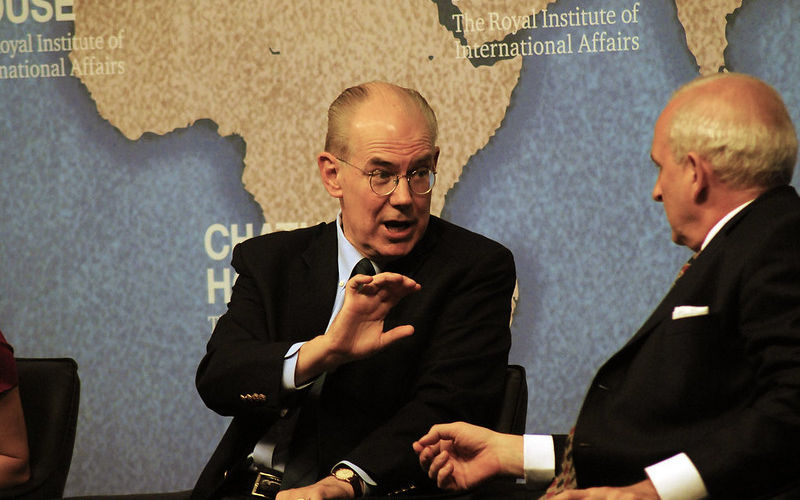Erik Paul: Australia beating the war drums
April 15, 2022
Given Australias strategic alliance with the US and the militarisation of the continent in preparation for war against China, Australians should decide whether they want to go to war against China.
University of Chicago political scientist John Mearsheimer claims that the US provoked Russia to invade Ukraine. President Vladimir Putin took the bait and went to war in late February 2022 to overthrow Ukraine’s political regime headed by President Volodymyr Zelenskyy.
Mearsheimer believes that offensive realism energizes US foreign policy and relations. He claims that US’ liberal democracy is a failure because the state has been captured by nationalism and the power of the national security establishment.
In the US, nationalism is mobilised by the belief of American Exceptionalism and manifest destiny in worlds history. Mearsheimers ideal of a liberal market society isundermined by the rise of the US national security and military state. The geopolitical state in the US claims sovereign power, overriding liberal democracy.
President Dwight Eisenhower warned Americans of the threat to their democratic future by the growing power of the industrial-military and congressional complex. He warned Americans of the growing power of the national security state. Eisenhower said, in his farewell address on 17 January1961, we have been compelled to create a permanent armaments industry of vast proportion we must not fail to comprehend its grave implications We must guard against the acquisition of unwarranted influence, whether sought or unsought, by the military-industrial complex.
Mearsheimer admits that nationalism in the US and the rest of the world is stronger than liberalism. It works to undermine a US neoliberal political agenda to create a free market global economy. He concludes that the US’ liberal enterprise has failed, describing the fall of liberal hegemony as the failure of US attempts to remake the world in Americas image.
In his 2020 lecture at the University of Ottawa, he argued that US foreign policy has erred in the wrong directions, making a series of tragic and serious errors of judgment. US leaders bear the responsibility for creating a giant mess. He blames a crusader culture in foreign policy, turning a liberator to an occupier. The outcome, he says, is an international system moving from unipolarity to multipolarity, with the US sharing power with a growing China and a resurgent Russia.
Mearsheimer maintains his faith in an imaginary US society of unbounded liberalism ingrained in unfettered markets. Unfortunately, liberalism alone cannot prevail without US nationalism. Mearsheimers political ideology of liberalism and offensive realism appears deeply rooted in Christianitys salvation from evil and the coming end of history.
In the age of the Anthropocene, his unbounded faith in liberalism is unsustainable and Australian politicians should not be so eager to advance his doctrine of offensive realism and threats of a nuclear war. The future is more likely to put a premium on habitable and sustainable space and not markets dictated by desire and fabricated wants.
The neoliberal cult of the market has been criticised by philosopher John Gray who believes that thinking of market freedoms as derivatives from fundamental human rights, is a fundamental error. The Anglo-Saxon model of development has created failed states and contributed to the social breakdown of US society. Gray would agree with Mearsheimer that US foreign policy has been a disaster, causing great harm to other countries.
Historian Anatol Lieven recounts the human cost of US shock therapy forced on the former Soviet Union. He writes, I witnessed in Ukraine and Russia after the Soviet collapse, open borders, free-market reforms, and privatization became a license for predatory elites (comprising both old and new elements) to plunder state property and transfer the money to the West and various tax havens, with the enthusiastic help of Western banks .It caused great harm and suffering to the population.
In the US, neoliberal policy created a political crisis and President Donald Trump’s politics to make America great again, spawning a form of neo-fascism in US governance.
What are the implications for Australia? Mearsheimers message is that the US cannot be safe until both China and Russia become more like the US, tamed by market forces led by US financial corporations. He maintains that the US will not accept the rise of China as a regional hegemon and that a Sino-American war is more likely than war between the superpowers was during the Cold War'.
In 2014, Mearsheimer came to warn Australians of a coming war between the US and China and that Australians should prepare themselves for the likelihood of fighting against China. Given Australias strategic alliance with the US and the militarisation of the continent in preparation for war against China, Australians should decide whether they want to go to war against China.
Presently, that decision is made by the Prime Minister or Executive alone. Australians for War Powers Reform’s (AWP) survey shows that more than 80% of all Australians support the call to reform war powers. Australians should organize against Home Affairs Secretary Mike Peluzzos beating of the war drums and call to send off, yet again, our warriors to fight the nations wars.
Erik Paul is Vice President of the Centre for Peace and Conflict Studies (CPACS) at the University of Sydney and convenor of PACS6926 on Peace and Conflict in Southeast Asia in the Faculty of Arts and Social Sciences. He is an adjunct professor and a researcher specialising in Australias relations with the Asia-Pacific and issues of regional and world peace.

